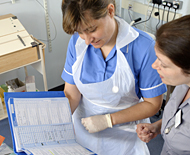Spontaneous wriggling or writhing movements which can occur when the medicine is working (i.e. the patient is 'on').
A rhythmic, oscillating movement, most commonly of the hands and or limbs.
When the patient is adequately treated and movements are reasonably fluent and spontaneous.
When when the patient's medication has worn off and movements are slow, deliberate and difficult. Other less visible symptoms of pain and distress may be a feature for some patients.
A noticeable transition from 'on' to 'off' occurring between doses of medication.
An umbrella term for the motor complications of more 'brittle' advanced disease. Patients can fluctuate from 'off', to 'on' and "on with dyskinesia." The change may be gradual or a sudden switch.
For Clinicians
Parkinson's Disease
Inpatient Care - information & guidance
Parkinson's care: some tips for getting it right
- Bed rest is dangerous
- chest infections
- stiffness
- The medicines matter
- don't omit, give on time
- always check the drug chart, know when the last dose was given and the next one is due
- People with PD need time
- communication
- nutrition: swallow may worsen when unwell or un-medicated
Know when to call for help
Know who to call
|

Please be aware:
The majority of patients with early PD can do well in hospital if they are given their medication and can swallow it - make sure they get it!
Zero tolerance for pharmacy code 4 in Parkinson's patients!
|
Further information
A Letter for My Friends
PD Care - Top 12 Tips
Care of the dying in PD
back to top


